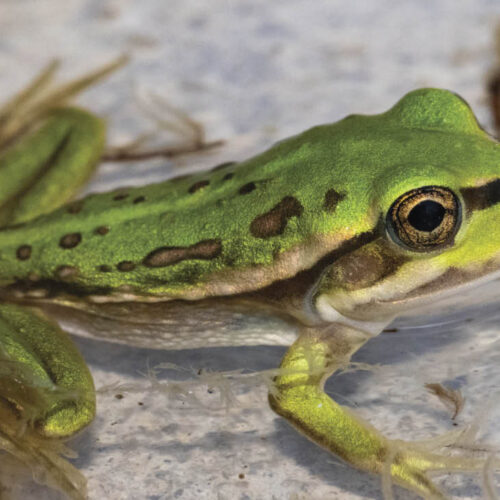Are we poisoning our children?
2018-04-30T04:28:17+10:00
Andre Leu is the author of 'Myths of Safe Pesticides' (2014, Acres USA) and now an updated and rewritten version that focuses on the effects of chemicals on our babies and children – 'Poisoning our Children'. The title is dramatic, but like climate change, Leu feels there is no time to waste in raising attention to these problems that grow in magnitude with every passing minute. Here in an edited extract, he continues our discussion on the health effects of chemicals.
Our children are precious, irreplaceable, and our future – but they are being damaged and poisoned by environmental toxins, including agricultural chemicals, on a daily basis. This is borne out by the global epidemic of non-communicable chronic diseases. According to the World Health Organisation:
“Non-communicable diseases (NCDs), such as heart disease, stroke, cancer, chronic respiratory diseases and diabetes, are the leading cause of mortality in the world. This invisible epidemic is an under-appreciated cause of poverty and hinders the economic development of many countries. The burden is growing — the number of people, families and communities afflicted is increasing.” *
You cannot catch these diseases from other people. You will not get cancer, heart disease or diabetes from sitting next to people with these diseases. The multiple causes are environmental, which means that we can prevent them by changing our habits, food, water etc, to avoid the environmental exposures that cause them.
There is now a large body of published science showing that the pesticide residues in our food are a significant cause of this epidemic and why our children are the most vulnerable to them. Unfortunately, most of our children are being exposed to a large range of toxic compounds because government regulators are not acting on the huge body of scientific evidence linking them to the increase of diseases and behavioural problems affecting children.
A highly important meta-study was published in a special issue of the scientific journal Carcinogenesis, in which over two hundred cancer experts show how mixtures of minute amounts of common chemicals, including pesticides, play a significant role in children developing cancers— both in childhood and as adults later in life.
Scientific research shows that our children are being born pre-polluted by toxic cocktails of pesticides, food additives, and other dangerous chemicals and that current regulatory systems around the world have failed to protect unborn and growing children from this exposure.
Multiple pesticide residues have been found in semen, ovarian follicular fluid, amniotic fluid, maternal blood, placental and umbilical cord blood, breast milk, meconium of newborns, and in the urine of children. The US Environmental Working Group found up to 232 chemicals in the placental cord blood of babies (1).
Increased risk
Children are the most vulnerable to harm caused by chemicals and have the highest levels of pesticide exposure due to their food consumption in relation to body weight. Of particular concern is that the foetus and newborn possess lower concentrations of protective serum proteins than adults, so they cannot detoxify the smallest amounts of toxic chemicals. A major consequence of this vulnerability is a greater susceptibility to cancers and developmental neurotoxicity, where the poison damages the developing nervous system.
Children are also more vulnerable to the effects of endocrine (hormone) disrupters because their tissues and organs rely on balanced hormone signals to ensure that they develop in orderly sequences. Small disruptions in these hormone signals by endocrine-disrupting chemicals can significantly alter how these body parts and metabolic systems develop. These altered effects will not only last a lifetime, they can be passed on to future generations. In effect, they program children for a lifetime of ill health.
Most children get the majority of their exposure to pesticides from residues in amounts permitted in food. They also may get a cocktail of toxic chemicals directly, via their mother’s food through the placenta when they are in the womb, or through breast milk. Pesticides used in the house, garden, playgrounds, parks, and sidewalks are other critical areas where children are exposed to pesticide residues.
Avoiding the toxins
The U.S. President’s Cancer Panel report and other research show that around 80 percent of cancers are caused by environmental exposures (including alcohol and tobacco), especially to toxic chemicals. Eliminating exposure to these, especially for children (as much of the damage is done when they are in utero or when they are still rapidly growing) is the easiest way to prevent cancer from developing.2
Prevention is always better than cure. No other health initiative can achieve such an impressive reduction in serious diseases – and informed individuals can do this although government and regulatory support would speed up the process.
Research shows that eating organic food can virtually eliminate harmful pesticide exposure quickly. Not only will this prevent the multiple health problems caused by pesticides, but the most comprehensive study ever done comparing organic and conventional foods clearly shows that organic foods are more nutritious and healthy with higher levels of disease-preventing antioxidants3.
Myths exposed
We are told by governments and industries that the pesticides in our food are safe and not to be concerned. However, much of the criteria used to underpin the current pesticide use patterns are based on out-of-date and flawed assumptions rather than on the latest published science. In reality, these assumptions are a series of mythologies.
1. The “Rigorously Tested” Myth.
Most pesticide formulations sold on the market are not tested for safety, and there is no specific testing for the unique requirements of unborn, newborn, and developing children.
2. The “Very Small Amount” Myth.
Even the smallest amounts of chemical residues can be harmful. Many of these chemicals disrupt the endocrine (hormone) system, and children, especially the developing foetus, are the most vulnerable.
3. The “Breakdown” Myth.
Many pesticides are actually more toxic when they biodegrade.
4. The “Reliable Regulatory Authority” Myth.
Regulatory authorities are ignoring a large body of peer-reviewed science showing the harm caused by pesticides and making decisions on data-free assumptions.
5. The “Pesticides Are Essential to Farming” Myth.
Toxic synthetic pesticides are not needed in farming, as organic farming is capable of producing enough food to feed the world.
A study published in Nature Communications last year revealed
this was possible if tied with reduced meat consumption.
Major research breakthroughs
In the 1990s, the chemical disruption of the reproduction and hormone systems of all species, including humans, was brought to the public’s attention by books like Theo Colborn, Dianne Dumanoski, and John Peterson Myers’s Our Stolen Future, and Deborah Cadbury’s The Feminization of Nature.
The peer-reviewed science summarized in these books showed that many chemicals, especially agricultural chemicals, were mimicking hormones such as estrogen, causing serious declines in fertility by reducing the quantity and quality of sperm production and damaging the genital urinary systems. They were major contributors to the dramatic rise in cancers of the sexual tissues—breast, endometrial, uterine, ovarian, vaginal, testicular, and prostate cancers. Endocrine disruption is not just affecting human reproduction; it affects nearly all sexually reproducing species, including plants and animals, as the same hormones are the basis of all sexual reproduction.
We can help reverse this massive extinction event by changing agriculture to use agro-ecological approaches to produce the high yields of quality food that we need to feed a growing population without toxic synthetic chemicals. Millions of organic farmers are already doing this, and we need to shift the billions of dollars spent every year on agricultural research away from toxic chemicals and genetically modified organisms (GMOs) to regenerative, organic and ecological agriculture. You may feel overwhelmed by the magnitude of the problems, but each one of us can be significant change agents for a better future.
Did you know?
A large body of published, peer-reviewed research shows that pesticide exposure in unborn and growing children is linked to:
- Cancers
- Thyroid disorders
- Immune system problems
- Lower IQs
- Attention deficit hyperactivity disorder
- Autism spectrum disorders
- Lack of physical coordination
- Loss of temper—anger management issues
- Bipolar/schizophrenia spectrum of illnesses
- Depression
- Digestive system problems
- Cardiovascular disease
- Reproductive problems (as adults)
- Deformities of the genital-urinary systems
- Changes to metabolic systems, including childhood obesity and diabetes.
* Source: http://www.who.int/gho/ncd/en/
1 “Pollution in Minority Newborns: BPA and other Cord Blood Pollutants,” EWG, November 23, 2009.
2 Suzanne H. Reuben, “U.S. President’s Cancer Panel 2008–2009 Annual Report; Reducing Environmental Cancer Risk: What We Can Do Now.”
3 M. Baranski et al., “Higher Antioxidant Concentrations and Less Cadmium and Pesticide Residues in Organically-Grown Crops: A Systematic Literature Review and Meta-Analyses,” British Journal of Nutrition 112, no. 5 (September 14, 2014): 794–811.






